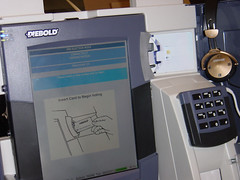Future Now
The IFTF Blog
The Trouble with Electronic Voting
In the wake of Ohio's lawsuit against Premiere Elections (the company formerly known as Diebold), a 2006 interview with Republican cyber-security expert and former CEO of Cybrinth Stephen Spoonamore has popped up online. In the interview he discusses how easy it is to tamper and hack the e-voting machines (via AlterNet, YouTube videos embedded below).

Conspiracy theory? Could be, but keep in mind that Spoonamore also happens to be a cyber-security expert witness and is also a Republican. Regardless of partisan motivation or lack thereof, this multi-segment interview raises a number of implications for the future of the United States election system in a digital world.
From Segment Six:
Let's think about this... Two graduate students in three hours successfully hacked the machine. And once they'd completed running their hack, they then added a four-line code of self-erasing virus to allow it to propagate across a network. That's just two guys with two hours who had no interest or motivation in doing it other than the scientific interest.
As we discussed in our Future of Making work, hackers are a serious force in technological innovation and development, and will only become more influential in the coming decade. At the same time, social and political processes are being converted from analog to digital. And if someone can create it, it's very likely that someone can also hack it. According to EFF, "Twenty-three states still do not require a paper record of all votes, despite the demonstrated technical failures of e-voting machines in the 2004 presidential election—including the complete loss of thousands of votes."
At the very least, this interview raises an important question about the digital future: In order to eliminate threats from hackers, corporate-sanctioned or otherwise, are some processes best left analog?
The interview segments:<p/>
Part 1
Part 2
Part 3
Part 4
Part 5
Part 6
Part 7
Part 8



